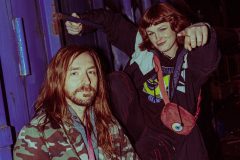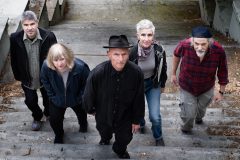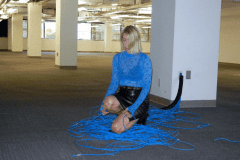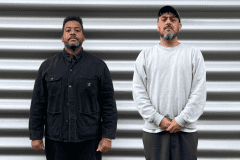Give A Little Love; An interview with Keegan Dewitt of Wild Cub
Nashville, Tenn. band Wild Cub, led by songwriter/composer Keegan Dewitt and multi-instrumentalist Jeremy Bullock, delivers songs that transition seamlessly between electro-pop, cinematic and danceable new wave and groove with tropical rhythms. This evocative approach isn’t wholly surprising, considering DeWitt has performed extensive work in composing film scores that includes two films showcasing at the Sundance Film Festival this month: “Listen Up Philip,” directed by Alex Ross Perry and starring Jason Schwartzman (“Rushmore,” “Bored To Death”) and Elisabeth Moss (“Mad Men”), and “Land Ho!” directed by Martha Stephens and Aaron Katz. DeWitt also scored the 2013 Academy Award-winning short documentary “Inocente,” the 2013 Sundance Audience Award for Best of NEXT winner “This Is Martin Bonner,” and 2010’s “Cold Weather,” among other films.
Fresh from a December tour that included sold-out shows with Bastille, the band is set to launch a four-week U.S. headlining tour in support of its debut, Youth. With some of the tracks recorded and produced by Jim Eno (Spoon), Wild Cub is perfectly poised to delight fans and tastemakers alike. Ghettoblaster recently chatted with Dewitt about the band’s approach and influences.
Are you all originally from Nashville or transplants?
We are almost all transplants. I lived in New York City for eight years before moving so I could pursue music and film scoring full time. So many people in New York are hustling just to split their time 50/50… and for me it felt like I was getting a 50 percent return on each. Moving allowed me to really shift into making the arts my full time job.
Does the competition for attention there intimidate or inspire you?
We always made a conscious decision to focus on reaching people outside of wherever we may have been living at the time. We were all floating around, splitting time between different places, so our competition was more with ourselves. We were each pursing something solo, whether as a songwriter, performer or player for someone else. As we gathered to start recording the Wild Cub record, we really wanted to seize it as a way to try and write/record and tell stories in a way we hadn’t been able to before. For me that meant rhythm first, taking our faces of it, taking our names out of the liner notes — just letting these scattered memories tell a more compelling story.
What were the main catalysts that inspired Youth artistically? Did you realize you were being inspired by those at the time or is hind-sight twenty-twenty?
At the time, I was really steeped in the writing of Philip Larkin. He was really trying to dig towards what it meant to progress from adolescence into something a bit more nuanced. His poem “When First We Faced And Touching Showed” especially impacted the themes on Youth. This idea that we are so formed by all of the experiences we’ve been through as we grow up, and although they are painful, they are critical to our identities. I also started to identify with a lot of themes that Jonathan Lethem was exploring, about maturing and how people begin to take shape based on what they are given or not given, what they use and misuse. His interview in the Paris Review hit just as I was about to record vocals and finish lyrics, I turned to the guys in the room and said “I think I’ve figured out what the record is”.
What were the circumstances surrounding the recording of the record?
We took apart Jeremy’s house and recruited our good friend (and soon after, drummer) Dabney Morris to produce. We decided on a whim to essentially turn the place into a small intimate studio to finish these sketches that Jeremy and I had been working on between one another in our separate home studios. It was a way of forcing Jeremy and I to complete this idea of forming Wild Cub.
What was it like working with Jim Eno?
He is a hero for us, his bravery to really use exclusivity as a construct in music. His taste in terms of what to use and more importantly… what NOT to use is pretty impeccable. He represented something I admire most in art: restraint. He knows when to hold back, and then when to very, very tastefully deliver. Every Spoon record is such an exercise in that exact thing. It felt so nice to be able to just defer to Jim on that. So often, you spend time wondering “should we?” or “shouldn’t we?” With Jim, you just trust him without question.
I hear some Peter Gabriel influence in your sound. Has he influenced you?
Gabriel is certainly a huge inspiration for Eric (keys). I appreciate where we intersect with him in terms of trying to embody emotional energy in songs. He does such an artful job of blending true intelligence and depth (both musically and lyrically) with raw emotion. That’s so much more difficult than you’d think. He is a great reference for how to do it correctly.
How did you get hooked up with Dale Earnhardt Jr. Jr. for the “Thunder Clatter” mix?
That was a lucky coincidence for us in that our manager had a connection. We were quick to jump on it. We’ve always appreciated what they do. Remixes are both exciting and a bit of a nail biter in that way. You are handing off something you’ve worked hard on to people you admire and essentially asking them to grant the value of their time to it. We were so happy with what they came back with.
What difference do you find in composing for film and for an album with Wild Cub?
As I said above, restraint is something we try and straddle and that we admire a lot. Film composing is special in that you can really use something very, very minimal to maximum effect. The virtue of pop music like Wild Cub is that we can create something that is massively layered, something with so many different contrasting emotions and impulses. So much of what we do is trying to shine a light on complex emotional moments and allow people an opportunity to identify with and bring identity to those things within themselves. In pop music, we get to harness a complex collection of elements to illustrate just how layered and chaotic those emotional moments can be. That’s exciting.
As a young band, do you ever worry that you’ll sky rocket to the top and then flame out, or do you believe there is a consistently successful future in the cards for Wild Cub?
That’s for other people to worry about, for us… it’s working hard every single night with these shows, really working for people. Really digging to create depth in the work so that people can connect multiple times on multiple levels. The rest is just not something within our control and not that useful to spend any brain power on.
What are you most anticipating or look forward to from your forthcoming tour?
It’s a silly metaphor, but it applies here… “if a tree falls in the woods does anyone hear it”? It is one thing to record a group of songs in your home-made studio and throw it up on BandCamp, it’s another to get the very rare opportunity to share it with large groups of people every single night. We are extremely grateful for that. These songs take on a new depth, a new meaning, every single night. We get to bring them to people, explore them physically on stage. It’s an entirely different thing that we are just beginning to explore.
(Catch Wild Cub on their U.S. tour with Hands, followed by a string of festival performances. Here’s the full routing:
Feb 5 – Turf Club – St Paul, MN ^
Feb 6 – Turner Hall – Milwaukee, WI ^
Feb 7 – Do317 Lounge – Indianapolis, IN
Feb 8 – Subterranean – Chicago, IL ^
Feb 10 – The Basement – Columbus, OH ^
Feb 11 – Magic Stick – Detroit, MI ^
Feb 13 – The Hollow – Albany, NY ^
Feb 14 – Higher Ground – Burlington, VT ^
Feb 15 – Brighton Music Hall – Boston, MA ^
Feb 17 – The Met – Providence, RI ^
Feb 18 – Bowery Ballroom – New York, NY ^
Feb 21 – Johnny Brenda’s – Philadelphia, PA ^
March 2 – 3rd & Lindsley – Nashville, TN
April 25-27 – CounterPoint Music Festival – Atlanta, GA
May 16-18 – Hangout Festival – Gulf Shores, AL
June 19-22 – Firefly Music Festival – Dover, DE
^ with Hands)








Social Media